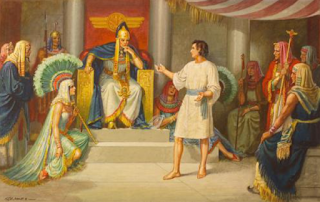And the thing
was good in the eyes of Pharaoh, and in the eyes of all his servants. And
Pharaoh said unto his servants, Can we find such a one as this is, a man
in whom the Spirit of God is? (Gen. 41:37-38).
COMMON GRACE
ARGUMENT:
“How could this
heathen say such seemingly godly words apart from a common grace (i.e., a
gracious influence of the Spirit upon and within him)?”
(I)
Robert C. Harbach (1914-1996)
[Source: Studies in the Book of Genesis (RFPA, 2001), pp. 768-769]
How shall we understand these words? Let us say, as most commentators, that here is expressed the thinking of a depraved, ungodly heathen. After all, what can you expect of a pagan despot who knows no religion but the dark mazes of polytheism? Taking, then, Pharaoh’s words as typical heathenism, what would be meant by them? Do these words mean that Pharaoh could discern the Spirit of God in Joseph, that the Egyptians themselves had so much spiritual discernment as to be able to see a supernatural element involved in Joseph’s ability to interpret Egyptian dreams? Is this evidence of “common grace” in Pharaoh and his people?
Was there “a measure of the knowledge and fear of God still left to the Egyptians at this point of history”? Not at all; for according to the interpretation now under review, Pharaoh merely commends Joseph as a man in whom is “the spirit of the gods,” which, by the way, is a quite possible and legitimate translation of the words. (Cp. Dan. 4:8, 9, 18; 5:11, 14).
This then would be to ascribe omniscience to the Egyptian gods, but worse, to proclaim Joseph as a medium in preternatural communion with demons. In this view, the royal laudation therefore is not gracious, since it puts Joseph in a heathenish mediumistic connection. Further, it was not even made in the glimmerings of natural light, but from within the darkness of the occult.
But is there another possible way of looking at Pharaoh and his words? Could it be that God’s sovereign, irresistible grace worked in Pharaoh, just as, surely, the Spirit of God had worked in Joseph? May we conclude that, just as “the Lord blessed the Egyptian’s house for Joseph’s sake” (39:5), so also He blessed the Egyptian monarch himself with the blessing of true faith? Could Joseph’s witness in Egypt (Psm. 105:21-22) have been efficacious, resulting in converts to the religion of Jehovah? To these queries we answer unhesitatingly in the affirmative!
-----------------------------------------------------
(II)
More to Come! (DV)

No comments:
Post a Comment